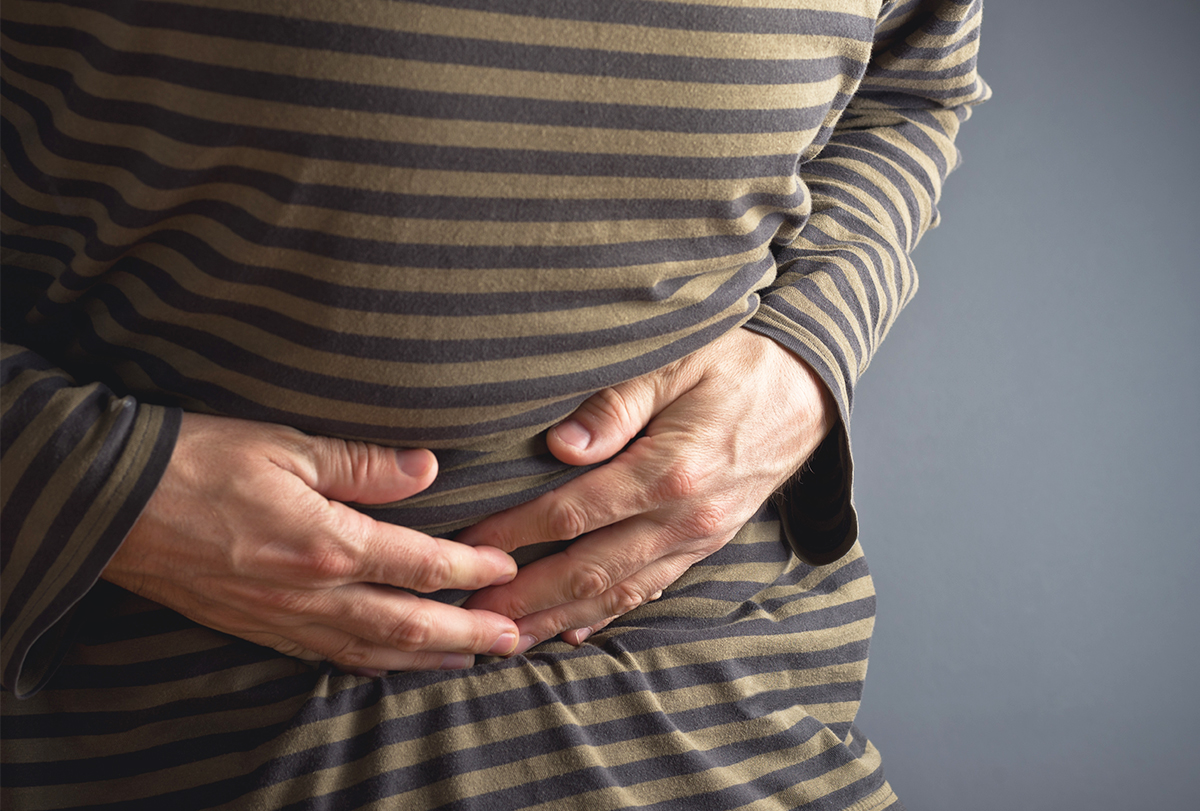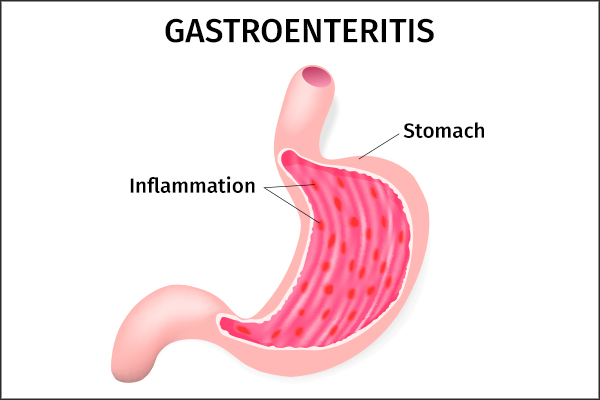In this article:
Gastroenteritis is characterized by inflammation/irritation of the gastrointestinal (GI) tract, generally caused by infectious pathogens (bacteria, viruses, parasites, fungi) or noninfectious agents (heavy metals, chemicals, medications).

Viral gastroenteritis is the most common infectious cause of gastroenteritis and is a frequent cause of visits to hospitals and clinics.
Causes of Gastroenteritis
Gastroenteritis is commonly caused by infectious pathogens such as bacteria, viruses, parasites, and fungi. Other noninfectious causes include chemicals and heavy metals, such as lead and certain medications (colchicine, digoxin, antibiotics, antihelminthics, antacids, laxatives, radiation, and chemotherapy).
Ingestion of certain plants (oleander, foxglove, hemlock) and mushrooms may also result in gastroenteritis along with other harmful manifestations. (1)(2)

Notable infectious pathogens include:
Bacteria:
- Campylobacter
- Salmonella
- Shigella
- Yersinia
- Vibrio cholerae
- Staphylococcus aureus
- Escherichia coli
- Clostridium difficile
- Clostridium perfringens
Viruses:
- Norovirus
- Calicivirus
- Rotavirus
- Astrovirus
- Adenovirus
Parasites:
- Entamoeba histolytica
- Giardia lamblia
- Cryptosporidium
Symptoms of Gastroenteritis
The GI symptoms of gastroenteritis can range from mild to moderate to severe depending on the infectious etiology and person affected. Individuals with a compromised immune system or on immunosuppressive therapy may be more susceptible to more severe GI infections and manifestations.
Mild/moderate symptoms include:
In severe cases, the symptoms include:
Treatment for Gastroenteritis

Treatment for gastroenteritis usually consists of ensuring proper hydration by drinking plenty of water, electrolyte drinks, and/or oral rehydration drinks. In severe cases, individuals can be admitted to the hospital and receive an intravenous fluid drip for fluids, (4) vitamins, and nutrients.
If the pathogen is confirmed as bacterial, the patient can receive antibiotics. Alternatively, a parasitic pathogen can be treated with medical therapy.
Diagnosing Gastroenteritis
A diagnosis of gastroenteritis is achieved by the physician first taking a full history of the present illness, symptoms, and/or any treatments attempted.
Laboratory examination is usually not required. However, in some serious cases with blood in the stool or high fever, a stool culture can be obtained to narrow down to a specific diagnosis.
Testing for ova and parasites in the stool can also be helpful. Ultrasounds, X-rays, or CT scans are not usually helpful in achieving a diagnosis.
Foods to Avoid During Gastroenteritis
Individuals suffering from gastroenteritis should not consume any food for a few hours. Instead, it is recommended to sip on plenty of fluids during this time to prevent dehydration.
When introducing food back into the diet, it is preferred to start with soft, easily digestible foods first, such as Jell-O, soda crackers, bananas, mashed potatoes, toast, nuts, and rice.
Best Preventive Tips for Gastroenteritis

The best prevention for gastroenteritis is frequent handwashing in the following conditions:
- Before and after handling food
- Treating wounds for a sick individual
- Handling contact lenses
- After using the toilet or changing a diaper
- After petting animals
- After handling garbage
- Coughing or sneezing
Using soap and water is the best way to wash your hands thoroughly and effectively. A hand sanitizer is a good alternative if you are unable to wash your hands.
Risk Factors for Gastroenteritis
There are several risk factors for gastroenteritis, including:
- Not washing hands frequently
- Exposure to an individual with bacterial gastroenteritis in places such as a daycare
- Undercooked meat or poultry (5)
- Unpasteurized dairy products (5)
- Raw shellfish
- Community outbreaks
- Animal exposure in petting zoos, farms, etc.
- Exposure to freshwater
- International travel
Most-Asked Questions About Gastroenteritis

How long does gastroenteritis last?
Gastroenteritis is ordinarily a self-limiting illness that may not need supportive management in otherwise healthy people.
Depending on the etiology and type of infectious gastroenteritis, the GI manifestations can appear from hours to days after exposure to the pathogen and may persist for a day or two. Symptoms may also last for longer durations, up to 10 days depending on the individual. (6)
What is the difference between gastroenteritis and stomach flu?
“Stomach flu” is another term used for gastroenteritis and is caused by infectious agents/pathogens. Stomach flu is not caused by the influenza virus, the respiratory virus that causes “the flu.”
Is gastroenteritis contagious?
Gastroenteritis is contagious and can vary depending on the viral pathogen. Norovirus is a common virus that causes gastroenteritis that can be contagious from symptom onset to a few days after recovery.
Additionally, this virus can remain in the stool for up to 2 weeks. Rotavirus is another common viral pathogen that causes gastroenteritis that is also contagious up to 2 weeks after recovery. (7)
Final Word
It is important to practice preventative measures such as observing proper hygiene, practicing regular handwashing with soap, and maintaining distance from individuals who may have gastroenteritis or “stomach flu” or exhibiting GI symptoms (abdominal cramps/pain, nausea, vomiting, diarrhea).
If you are experiencing symptoms consistent with gastroenteritis, is vital to keep your distance from others to further prevent community spread. It is essential to stay well hydrated with sports drinks that contain electrolytes and avoid high-sugar beverages, as the majority of gastroenteritis cases are self-limited.
In severe gastroenteritis cases causing profuse or bloody diarrhea, volume depletion, tachycardia, hypotension, altered mental status, dry mouth, and decreased urine output, a visit to the emergency department or hospital may be warranted.
- Was this article helpful?
- YES, THANKS!NOT REALLY


